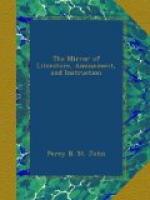PIG-FRY—This is a Collop Monday dish, and is a necessary appendage to “cracklings.” It consists of the fattest parts of the entrails of the pig, broiled in an oven. Numerous herbs, spices, &c. are added to it; and upon the whole, it is a more sightly “course” at table than fat cracklings. Sometimes the good wife indulges her house with a pancake, as an assurance that she has not forgotten to provide for Shrove Tuesday. The servants are also treated with “a drop of something good” on this occasion; and are allowed (if they have nothing of importance to require their immediate attention) to spend the afternoon in conviviality.
AVVER BREAD.—During Lent, in the same county, a great quantity of bread, called avver bread, is made. It is of oats, leavened and kneaded into a large, thin, round cake, which is placed upon a “girdle"[17] over the fire. The bread is about the thickness of a “lady’s” slice of bread and butter.
[17] Rutherglen, in Lanarkshire,
has also long been celebrated
for
baking sour cakes—See vol.
X. MIRROR, p 316.—I am of
opinion
these cakes are of precisely the same make and origin
as
those
to which the writer alludes under the above name of
“sour
cakes,”
which I presume he must have forgotten the name of.
I
should
have mentioned, that when these cakes (for they are
frequently
called avver cakes) are baked, the fire must
be of
wood;
they never bake them over any other fire. These
cakes are
of
a remarkably strong, sour taste. I should further
note, that
the
girdle is attached to a “crane”
affixed in the chimney.
I am totally unable to give a definition of the word avver, and should feel much gratified by any correspondent’s elucidation. I think P.T.W. may possibly assist me on this point; and if so, I shall be much obliged. There is an evident corruption in it. I have sometimes thought that avver means oaten, although I have no other authority than from knowing the strange pronunciation given to other words.
W.H.H.
* * * * *
THE CONTEMPORARY TRAVELLER.
* * * * *




